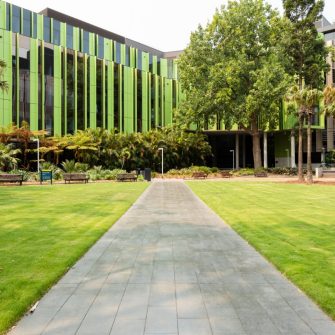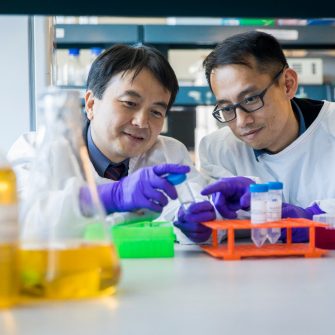Master of Reproductive Medicine
- Commencing Terms
- Term 1 & 3
- Duration
- 1 Year(s)
- Delivery Mode
- Online
- Campus
-
Kensington
- Codes
- Program code 9065
- CRICOS code -
-
2026 Indicative first year full fee
- $35,000*
-
2026 Indicative full fee to complete degree
- $35,000*
-
2026 Indicative first year full fee
- $40,000*
-
2026 Indicative full fee to complete degree
- $41,000*

Application closures for 2026
International applications for all undergraduate programs, as well as postgraduate programs offered by the faculties of Arts, Design & Architecture, Engineering (excluding Master of Information Technology and associated programs) and Science are now closed to New Overseas Student Commencement (NOSC) for 2026 intakes.
Postgraduate programs offered by the Business School and the faculties of Law & Justice and Medicine & Health remain open. Master of Information Technology (and associated programs) also remain open.
- Overview
- Entry requirements
- What will I study?
- Future careers
- How to apply
- Fees & Scholarships
Overview
The Master of Reproductive Medicine is a research-driven, market-leading program designed to meet the growing global demand for expertise in fertility, reproductive medicine and women’s health.
With over 13 million In Vitro Fertilisation (IVF) births globally, the rising use of Assisted Reproductive Technology (ART) underscores a critical need for trained professionals in this field. Focusing on clinical practice on topics such as menopause, perimenopause, endometriosis, fertility and contraception, you'll be at the forefront of medico-scientific technology addressing and contributing to global issues surrounding sexual and reproductive health through innovative care and advocacy.
This degree is designed to assist early-career and experienced practitioners advance their careers in general practice, family planning, gynaecology, nursing, counselling, or biological sciences, with a focus on menopause and infertility care. Delivered 100% online, the program offers working professionals with the flexibility they need to balance other life commitments.
Key features
Meeting Australia’s reproductive health training needs
With around 20,000 babies born from IVF in Australia each year, Australia’s growing reliance on reproductive technologies, and a national shortage of gynaecologists, there is an urgent need for specialised training in women’s health. The Master of Reproductive Medicine equips you with the skills and knowledge to help address this demand and advance your career.
Future-focused practical learning in women’s health
Reproductive medicine is a rapidly evolving field, driven by innovations like UNSW and Monash University’s IVF-enhancing microchip and Australia’s first successful uterus transplant. This program provides practical skills and specialist knowledge needed to pursue clinical and non-clinical careers at the forefront of medico-scientific technology.
Flexible and progressive online learning
Complete your study from anywhere in the world. This program is delivered 100% online and features a flexible structure that supports working professionals and fosters collaborative learning. There is a clear pathway from the Graduate Certificate in Reproductive Medicine and Graduate Diploma in Reproductive Medicine through to the master’s degree.
Designed for healthcare professionals
The study of women’s health and reproductive medicine is ideal for medical professionals, including General Practitioners (GPs), family planning practitioners, and specialist gynaecologists focused on menopause and infertility, as well as those in nursing, counselling, allied health and biological sciences.
Why study at UNSW?
Learn from leading researchers
UNSW is home to one of the largest groups of clinical and scientific researchers in reproductive medicine in the southern hemisphere. Our academics and clinicians bring deep expertise across fields like obstetrics, gynaecology, reproductive medicine, gynaecological oncology, minimal access surgery, primary care and medico-legal advocacy. Others are thought leaders in scientific disciplines as diverse as fetal and maternal physiology, reproductive biology, health economics and epidemiology, molecular and cellular oncology and biostatistics.
Our expertise is reflected in initiatives like the world-first Endometriosis Research Institute, which highlights UNSW’s commitment to advancing women’s health. This strong connection to the real-world of ‘hands-on’ medicine ensures our courses are grounded in current, practical knowledge.
Join a global network of reproductive medicine leaders
Engage with a thriving community of alumni who hold leadership roles across public and private health sectors in Australia and around the world. The School of Clinical Medicine provides access to a broad professional network and real-world insights that strengthen career pathways in reproductive and women’s health.
Transformative industry links with top health and research institutions
At UNSW, we collaborate with leading hospitals, research institutes and healthcare organisations to shape the future of reproductive and women’s health. These partnerships allow us to continuously refine the way we teach and practice medicine, integrating emerging technologies and insights into our courses and clinical environments.
You'll benefit from research and collaboration opportunities through internationally recognised centres such as the National Perinatal Epidemiology and Statistics Unit (NPESU) and the Centre for Big Data Research in Health (CBDRH), which are translating ground-breaking research into real-world treatments and strategies.
Want to see more from UNSW Medicine and Health?
Entry requirements
For entry into this degree, you must have an undergraduate degree in medicine, nursing, health or medical science and one of the following:
- an honours, graduate certificate, graduate diploma or higher qualification in medicine, nursing, health or medical science
- commencement of a recognised postgraduate medical specialist training program (e.g. general practice, obstetrics & gynaecology)
- one year full-time equivalent of postgraduate professional experience in medicine, nursing, health or medical science.
English language requirements
You may be asked to provide evidence of your English proficiency to study at UNSW depending on your educational background and citizenship. English language skills are vitally important for coping with lectures, tutorials, assignments and examinations - this is why UNSW requires a minimum English language competency for enrolment.
If you’re completing an Australian Year 12 qualification (e.g. NSW HSC or equivalent), you do not need to provide anything extra to prove your proficiency. Your qualification will be used as evidence of your English proficiency.
If you do need to provide evidence of your English proficiency, this will be indicated in your application. You can prove this by providing evidence that you meet one or more of the following criteria:
- English language tests and university English courses
- Prior study in the medium of English
- Other qualifications
If you need to improve your English skills before you start your degree, UNSW College’s Academic English Programs are for you. The programs are suitable for various English levels and help you prepare for university studies and life in Australia.
For more details, visit the English Language Requirements page.
For entry into this degree, you must have an undergraduate degree in medicine, nursing, health or medical science and one of the following:
- an honours, graduate certificate, graduate diploma or higher qualification in medicine, nursing, health or medical science
- commencement of a recognised postgraduate medical specialist training program (e.g. general practice, obstetrics & gynaecology)
- one year full-time equivalent of postgraduate professional experience in medicine, nursing, health or medical science.
English language requirements
You may be asked to provide evidence of your English proficiency to study at UNSW depending on whether you are from an English-speaking background or non-English speaking background. English language skills are vitally important for coping with lectures, tutorials, assignments and examinations - this is why UNSW requires a minimum English language competency for enrolment.
If English is not your first language, you’ll need to provide proof of your English proficiency before you can be given an offer to study at UNSW. You can do this by providing evidence that you meet one or more of the following criteria:
- English language tests and university English courses
- Prior study in the medium of English
- Other qualifications
If you need to improve your English skills before you start your degree, UNSW College’s Academic English Programs are for you. The programs are suitable for various English levels and help you prepare for university studies and life in Australia.
For more details, visit the English Language Requirements page.
Check the specific English language requirements for this program
What will I study?
UNSW is introducing a new academic calendar from 2028.
We are moving to a new flex-semester calendar. What does this mean for your studies?
Program structure
The Master of Reproductive Medicine can be completed in one year of full-time study or two years part-time. Delivered 100% online, the program features a nested structure with a pathway from a graduate certificate and graduate diploma to this master degree, offering flexibility and progression for working professionals. These programs include:
Full program structure
Students must complete 48 units of credit (UOC), comprising on a combination of core courses and prescribed electives when taken as a standalone program. The program structure includes:
6 core courses – 36 UOC
- Reproductive Anatomy and Physiology
- Clinical Reproductive Endocrinology
- Female Fertility
- Fertility Treatments
- Reproductive, Perinatal Epidemiology and Biostatistics
- Male Fertility
2 prescribed electives – 12 UOC
- Contraception
- Laboratory Aspects of ART
- Menopause
- Ethics and Law in Reproductive Medicine
- The Impact of Infections on Reproductive Health
- Child and Adolescent Gynaecology
- Research Project in Reproductive or Women's Health
Future careers
Our expert clinical and academic staff will provide you with the skills required to deliver the highest standard of clinical care to your patients and clients.
You’ll gain demonstrable skills and knowledge which will allow you to enhance your present practice. This course is relevant to:
- General practitioners
- Those working in a family planning setting
- Obstetrician gynaecologists – particularly those in training
- Sexual health physicians & nurses
- Midwives
- Biological scientists
Our alumni
“I’m a fertility specialist and undertook the master’s during my subspecialty training. The master’s addressed some areas which were complementary to my training. I found these to be stimulating and enjoyable to study. The online learning made it possible to schedule my study around full-time work.”
Juliette Koch
Senior Fertility Specialist at Repromed
How to apply
Applications must be submitted through our Apply Online portal. We encourage you to submit your completed application as early as possible to ensure it will be processed in time for your preferred term. Some high-demand programs and Faculties with limited places may have an earlier application deadline or commencement date. Find out more.
Ready to start your application?
For most international students, applications are submitted via our Apply Online service. We encourage you to submit your completed application as early as possible to ensure it will be processed in time for your preferred term.
Some high-demand programs with limited places, may have an earlier application deadline or may have an earlier commencement date. For details, visit the international admissions information page.
Ready to start your application?
Fees & Scholarships
*Fees are subject to annual review (or when required) by the University and may vary accordingly.
Indicative fees are a guide only and have been calculated based on the typical enrolment patterns of students undertaking the program. The indicative fees listed here is an estimate for tuition only and excludes non-tuition fees and charges. The amount you pay will vary depending on the calendar year of enrolment, the courses you select and whether your study load is more or less than 1 Equivalent Full Time Student Load (48 units of credit (UOC) per year).
You should not rely on indicative fees as fee increases are assessed when required and may exceed the indicative figures listed here. Actual fees are calculated on enrolment. More information on fees can be found at the UNSW fees website.
*Fees are subject to annual review by the University and may increase annually, with the new fees effective from the start of each calendar year. The indicative fees listed here are based on an estimated average and are for tuition only, other fees and charges are not included. The amount you pay will vary depending on the calendar year to enrol, the courses you select and whether your study load is more or less than 1 Equivalent Full Time Student Load (8 courses per year).
Indicative fees are a guide for comparison only based on current conditions and available data. You should not rely on indicative fees. More information on fees can be found at the UNSW fees website.
Indicative fees to complete the program have been calculated based on a percentage increase for every year of the program. Fee increases are assessed annually and may exceed the indicative figures listed here.
Indicative fees to complete the program include tuition plus an estimate of study-related costs of approximately $1,000 per year. To find out more about other costs, visit UNSW International.
Scholarships
At UNSW, we award over $83 million in scholarships each year. We pride ourselves on rewarding excellence and making university accessible to students from all walks of life. Whether you’re a domestic or international student, our range of scholarships, prizes and awards can support your journey.
Progress starts here – at a world-leading university

Top 20 Worldwide
UNSW is ranked #20 university in the world
QS World University Rankings, 2024–2026

Most Employable Graduates
Winner of the AFR Most Employable University Award seven years in a row
AFR Top100 Future Leaders Awards, 2020–2026

Australia's #1 for Innovation
Highest number of startups and spinouts from university-developed tech
SCOPR report, 2024





